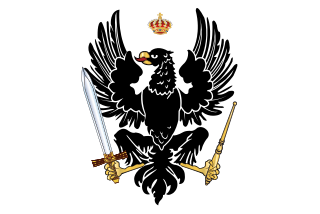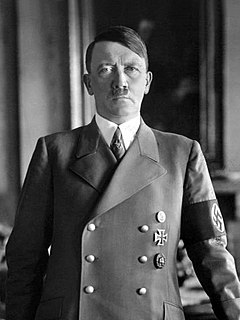
Berlin is the capital and largest city of Germany by both area and population. Its 3,748,148 (2018) inhabitants make it the second most populous city proper of the European Union after London. The city is one of Germany's 16 federal states. It is surrounded by the state of Brandenburg, and contiguous with Potsdam, Brandenburg's capital. The two cities are at the center of the Berlin-Brandenburg capital region, which is, with about six million inhabitants and an area of more than 30,000 km², Germany's third-largest metropolitan region after the Rhine-Ruhr and Rhine-Main regions.

The Berlin Wall was a guarded concrete barrier that physically and ideologically divided Berlin from 1961 to 1989. Construction of the Wall was commenced by the German Democratic Republic on 13 August 1961. The Wall cut off West Berlin from surrounding East Germany, including East Berlin. The barrier included guard towers placed along large concrete walls, accompanied by a wide area that contained anti-vehicle trenches, "fakir beds", and other defenses. The Eastern Bloc portrayed the Wall as protecting its population from fascist elements conspiring to prevent the "will of the people" in building a socialist state in East Germany.

Bavaria, officially the Free State of Bavaria, is a landlocked federal state of Germany, occupying its southeastern corner. With an area of 70,550.19 square kilometres, Bavaria is the largest German state by land area comprising roughly a fifth of the total land area of Germany. With 13 million inhabitants, it is Germany's second-most-populous state after North Rhine-Westphalia. Bavaria's main cities are Munich, Nuremberg and Augsburg.

Germany, officially the Federal Republic of Germany, is a country in Central and Western Europe, lying between the Baltic and North Seas to the north and the Alps, Lake Constance, and the High Rhine to the south. It borders Denmark to the north, Poland and the Czech Republic to the east, Austria and Switzerland to the south, France to the southwest, and Luxembourg, Belgium, and the Netherlands to the west.

German is a West Germanic language that is mainly spoken in Central Europe. It is the most widely spoken and official or co-official language in Germany, Austria, Switzerland, South Tyrol in Italy, the German-speaking Community of Belgium and Liechtenstein. It is one of the three official languages of Luxembourg and a co-official language in the Opole Voivodeship in Poland. The languages that are most similar to German are the other members of the West Germanic language branch, including Afrikaans, Dutch, English, the Frisian languages, Low German/Low Saxon, Luxembourgish, and Yiddish. There are strong similarities in vocabulary with Danish, Norwegian and Swedish, although those belong to the North Germanic group. German is the second most widely spoken Germanic language, after English.

The German Empire, also known the "Second Reich" or Imperial Germany, was the German nation state that existed from the unification of Germany in 1871 until the abdication of Emperor Wilhelm II in 1918.

East Germany, officially the German Democratic Republic, was a state that existed from 1949 to 1990, when the eastern portion of Germany was part of the Eastern Bloc during the Cold War. Commonly described as a communist state in English usage, it described itself as a socialist "workers' and peasants' state." It consisted of territory that was administered and occupied by Soviet forces following the end of World War II — the Soviet occupation zone of the Potsdam Agreement, bounded on the east by the Oder–Neisse line. The Soviet zone surrounded West Berlin but did not include it; as a result, West Berlin remained outside the jurisdiction of the GDR.

Nazi Germany is the common English name for Germany between 1933 and 1945, when Adolf Hitler and his Nazi Party (NSDAP) controlled the country through a dictatorship. Under Hitler's rule, Germany was transformed into a totalitarian state where nearly all aspects of life were controlled by the government. The official name of the state was Deutsches Reich until 1943 and Großdeutsches Reich from 1943 to 1945. Nazi Germany is also known as the Third Reich, meaning "Third Realm" or "Third Empire", the first two being the Holy Roman Empire (800–1806) and the German Empire (1871–1918). The Nazi regime ended after the Allies defeated Germany in May 1945, ending World War II in Europe.

World War II, also known as the Second World War, was a global war that lasted from 1939 to 1945. The vast majority of the world's countries—including all the great powers—eventually formed two opposing military alliances: the Allies and the Axis. A state of total war emerged, directly involving more than 100 million people from more than 30 countries. The major participants threw their entire economic, industrial, and scientific capabilities behind the war effort, blurring the distinction between civilian and military resources. World War II was the deadliest conflict in human history, marked by 70 to 85 million fatalities, most of whom were civilians in the Soviet Union and China. It included massacres, the genocide of the Holocaust, strategic bombing, premeditated death from starvation and disease, and the only use of nuclear weapons in war.

Wilhelm II or William II was the last German Emperor (Kaiser) and King of Prussia. He reigned from 15 June 1888 until his abdication on 9 November 1918 shortly before Germany's defeat in World War I.

Angela Dorothea Merkel is a German politician serving as chancellor of Germany since 2005. She served as the leader of the centre-right Christian Democratic Union (CDU) from 2000 to 2018. Merkel has been widely described as the de facto leader of the European Union, the most powerful woman in the world, and "leader of the free world".
Germans are a Germanic ethnic group native to Central Europe, who share a common German ancestry, culture and history. German is the shared mother tongue of a substantial majority of ethnic Germans.

The Germany national football team is the men's football team that has represented Germany in international competition since 1908. It is governed by the German Football Association, founded in 1900. Ever since the DFB was reinaugurated in 1949 the team has represented the Federal Republic of Germany. Under Allied occupation and division, two other separate national teams were also recognised by FIFA: the Saarland team representing the Saarland (1950–1956) and the East German team representing the German Democratic Republic (1952–1990). Both have been absorbed along with their records by the current national team. The official name and code "Germany FR (FRG)" was shortened to "Germany (GER)" following the reunification in 1990.

Deutsche Welle or DW is a German state-owned public international broadcaster. The service is available in 30 languages. DW's satellite television service consists of channels in English, German, Spanish, and Arabic. While funded by the German government, the work of DW is regulated by the Deutsche Welle Act, meaning that content is intended to be independent of government influence. DW is a member of the European Broadcasting Union (EBU).

Prussia was a historically prominent German state that originated in 1525 with a duchy centered on the region of Prussia on the southeast coast of the Baltic Sea. It was de facto dissolved by an emergency decree transferring powers of the Prussian government to German Chancellor Franz von Papen in 1932 and de jure by an Allied decree in 1947. For centuries, the House of Hohenzollern ruled Prussia, successfully expanding its size by way of an unusually well-organised and effective army. Prussia, with its capital first in Königsberg and then, in 1701, in Berlin, decisively shaped the history of Germany.

Adolf Hitler was a German politician and leader of the Nazi Party. He rose to power as the chancellor of Germany in 1933, and as Führer in 1934. During his dictatorship from 1933 to 1945, he initiated World War II in Europe by invading Poland on 1 September 1939. He was closely involved in military operations throughout the war and was central to the perpetration of the Holocaust. Hitler's actions and ideology are almost universally regarded as evil. According to historian Ian Kershaw, "Never in history has such ruination—physical and moral—been associated with the name of one man."

World War I, also known as the First World War, the Great War, the Seminal Catastrophe, and initially in North America as the European War, was a global war originating in Europe that lasted from 28 July 1914 to 11 November 1918. Contemporaneously described as "the war to end all wars", it led to the mobilisation of more than 70 million military personnel, including 60 million Europeans, making it one of the largest wars in history. It is also one of the deadliest conflicts in history, with an estimated nine million combatants and seven million civilian deaths as a direct result of the war, while resulting genocides and the resulting 1918 influenza pandemic caused another 50 to 100 million deaths worldwide.

The Holocaust, also known as the Shoah, was the World War II genocide of the European Jews. Between 1941 and 1945, across German-occupied Europe, Nazi Germany and its collaborators systematically murdered some six million Jews, around two-thirds of Europe's Jewish population. The murders were carried out in pogroms and mass shootings; by a policy of extermination through work in concentration camps; and in gas chambers and gas vans in German extermination camps, chiefly Auschwitz, Bełżec, Chełmno, Majdanek, Sobibór, and Treblinka in occupied Poland.
National Socialism, more commonly known as Nazism, is the ideology and practices associated with the Nazi Party—officially the National Socialist German Workers' Party —in Nazi Germany, and of other far-right groups with similar ideas and aims.

The Integrated Authority File or GND is an international authority file for the organisation of personal names, subject headings and corporate bodies from catalogues. It is used mainly for documentation in libraries and increasingly also by archives and museums. The GND is managed by the German National Library in cooperation with various regional library networks in German-speaking Europe and other partners. The GND falls under the Creative Commons Zero (CC0) licence.























